Questions – Case Study
1. The Causes of the Trade Dispute
2. The Relevance of this case study to the class
3. Lessons learned from the case study
4. An Update of the Dispute
5. Our Team’s Opinions
Hiring the law firm costed about US$200,000, of which an important part pertained to the claim on the AA. CIARA provided date and information related to the sector and INAI contributed to the building of arguments. INAI also performed the economic analysis of the Chilean PBS and reviewed the legal arguments.
The contribution of the private sector was impeccable. It could not be replicated again except in one instance.
Officials of DISCO, representatives of CIARA and INAI’s experts met when the drafts of the law firm were reformulated. There were also other participants, the Secretariat of Agriculture and the representatives from leading firms. At WTO, any official language could be used, but soon it switched to English.
The Argentine delegation didn’t have external lawyers and by the second session, most questions were directed to Chile, which were mostly on Argentine’s position.
Political issues came cropping up. First, business had to deal with favoring diplomacy over litigation. Business feared that the President might withdraw the demand if Chile eliminated sanitary restrictions on beef. Formal letter was written by Grains Exchange and CIARA, persuading the President that the trade prospects would be seriously wrecked if the government dropped the dispute. They also argued that the WTO decision would pave the way smooth for dealing with similar conflicts with the EU, and the Andean Community. And as a result, the fact that the case was becoming a winning case helped overcome other political calculations.
The struggle at home was mirrored at the WTO. The adoption of the panel recommendation didn’t mean that the issue was closed. When the case started, oils were subject to a 70% tariff. Since the dispute, the maximum is 31.5%. In addition, vegetable oil was excluded from the PBS.
Argentina’s tangible gain was the cap on Chilean tariffs. There were also intangible gains and the biggest loss for Chile might also be in an intangible form; their reputation for compliance. The WTO acted as a magnifying glass for a country’s reputation.
The core of this case is whether the price band counts in as a general tariff. Chile opinionated that the price band system was fair, but eventually, according to the panel’s judgments, Chile closed this process in 2001 July and November.
Questions – Case Study
1. The Causes of the Trade Dispute
On 5 October 2000, Argentina requested consultations with Chile concerning:
• the price band system established by Law 18.525 (as subsequently amended by Law 18.591 and Law 19.546), as well as implementing regulations and complementary and/or amending provisions; and
• the provisional safeguard measures adopted on 19 November 1999 by Decree No. 339 of the Ministry of Economy and the definitive safeguard measures imposed on 20 January 2000 by Decree No. 9 of the Ministry of Economy on the importation of various products, including wheat, wheat flour and edible vegetal oils.
Argentina considered that these measures raised questions concerning the obligations of Chile under various agreements. According to Argentina, the provisions with which the measures relating to the said price band system are inconsistent. According to Argentina, the provisions with which the safeguard measures are inconsistent. On 19 January 2001, Argentina requested the establishment of a panel. At its meeting on 1 February 2001, the DSB deferred the establishment of a panel.

- 오늘 본 자료가 없습니다.
- 특수아 가족의 어려움에 대한 기사를 소개하고 이론적 근거에 따라 설명하세요.
- 최근 신문기사(인터넷 기사 포함) 중에서 실태를 조사하여 보도한 자료를 찾아서 요약하여 제시하시오
- 국제금융론 중남미 외채위기 중남미외채위기의 원인 국가별 외채위기
- 변수의 기능에 따른 분류(독립, 종속, 매개, 조절변수)를 하고 각 변수에 대해 설명하시오 또한 본인이 연구하고 싶은 주제는 무엇인지 정하고 독립변수와 종속변수 및 조절변수를 이용하여 설명하시오
- 사회복지실천기술 중 생태도 작성의 특성 및 유용성에 대해 설명하고, 자신에게 영향을 미치는 미시체계(친구, 가족, 이웃), 중간체계(학교, 지역사회, 동호회, 종교단체 등), 거시체계(시도, 군구, 동, 국가, 법 등)는 어떤 것들이 있는지 그리고 어떤 영향을 주고받는지 기술하시오
해당 정보 및 게시물의 저작권과 기타 법적 책임은 자료 등록자에게 있습니다. 위 정보 및 게시물 내용의 불법적 이용,무단 전재·배포는 금지되어 있습니다. 저작권침해, 명예훼손 등 분쟁요소 발견 시 고객센터에 신고해 주시기 바랍니다.



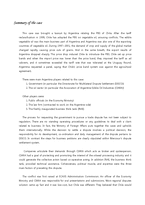
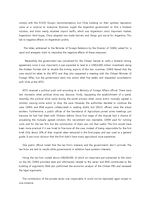
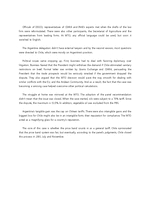
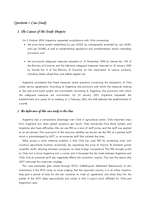
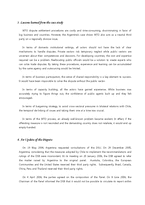
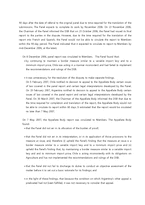
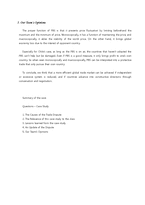
 분야
분야

